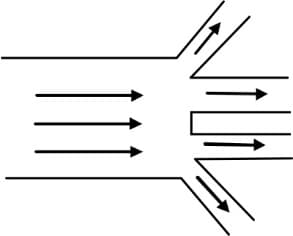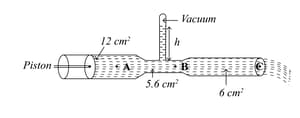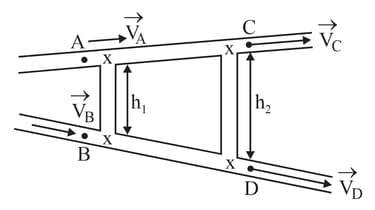Streamline Flow
Streamline Flow: Overview
This topic covers concepts such as Types of Fluid Flow, Steady Flow of Fluid, Streamline Flow, Laminar Flow, Turbulent Flow, Equation of Continuity, Condition for Start of Turbulence and Properties of Streamline.
Important Questions on Streamline Flow
A laminar stream is flowing vertically down from a tap of cross-section area 1 cm2. At a distance 10 below the tap, the cross-section area of the stream has reduced to 1/2 cm2. Find the volumetric flow rate of water from the tap
A cylindrical vessel open at the top is 20 cm high and 10 cm in diameter. A circular hole whose cross-sectional area 1cm2 is cut at the centre of the bottom of the vessel. Water flows from a tube above it into the vessel at the rate 100 cm3 s-1 . Find the height of water in the vessel under steady state.
The discharge in for laminar flow through a pipe of demeter having a centre line velocity of .
Streamline flow is more likely for liquids with _____ (low density/high density) and high viscosity.
Stream line flow of a liquid at a given point.
Flow in which the speed of the fluid at a point continuously changes in both magnitude and direction is called _____.
The platelets are drifting with the blood flowing in a streamline flow through a horizontal artery as shown below:

Artery is contracted in region . Choose the correct statement.
If the velocity head of a stream of water is equal to , then its speed of flow is approximately
Water is moving with a speed of through a pipe with a cross-sectional area of . The water gradually descends as the pipe increases in area to . The speed of flow at the lower level is
Statement 1: A water stream falls from a tap becomes narrower as it falls.
Statement 2: The velocity of water increases as it falls.
Water is flowing through a channel of width with a speed of . The water then flows into four identical channels of width of each. The depth of the water does not change as it flows into the four identical channels. Find the speed of the water in one of the smaller channel?

Blood is flow rate through a capillary of cross-sectional area of is . The velocity of flow of blood is -
A glass tube has three different cross sectional areas with the values indicated in the figure. A piston at the left end of the tube exerts pressure so that the mercury within the tube flows from the right end with a speed of . Three points within the tube are labeled and . The atmospheric pressure is ; and the density of mercury is (use ):

The small orifice between two communicating vessels have area sq. cm. The surface area of the horizontal sections of the first and the second vessel are and respectively. Initially the level of liquid in the first and second vessel is and from the orifice. Given that velocity of liquid flow is m/s, where h1 and h2 is the height of liquid in the two vessels, then the time required for the liquid to reach the same level is , where t is equal to
An ideal fluid is flowing in two pipes of the same cross-sectional pipe area. Both the pipes are connected with two vertical tubes, of length h1 and h2 as shown in the figure. The flow is streamline in both pipes. If the velocity of the fluid at A, B, and C are , , and respectively, the velocity of the fluid at (in m/s) is . Find the value of

A stream of water flowing horizontally with a speed of gushes out of a tube of cross-sectional area and hits a vertical wall normally. Assuming that it does not rebound from the wall, the force exerted on the wall by the impact of water is:
A container has a hole at the bottom of area Liquid is being added at the rate into it so that height of liquid in container remains constant. The height of liquid in container at equilibrium is
Water from a tap emerges vertically downwards with an initial velocity . Assuming pressure is constant throughout the stream of water and the flow is steady, find the distance from the tap at which cross-sectional area of stream is half of the cross-sectional area of stream at the tap:
A liquid is allowed into a tube of a truncated cone shape. Identify the correct statement from the following.
